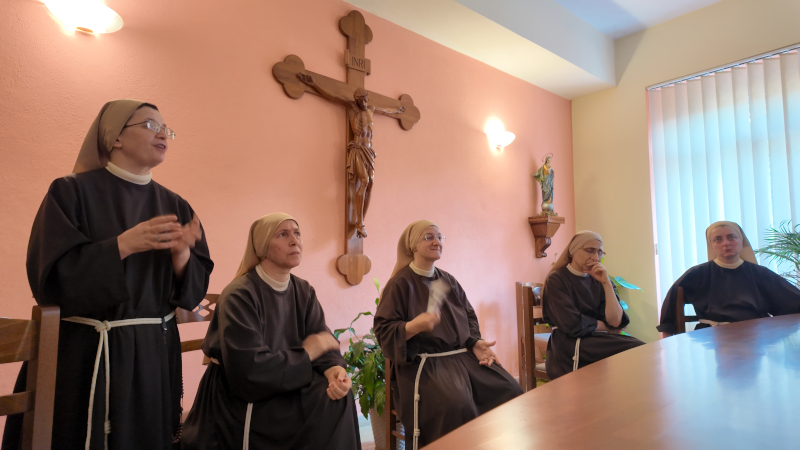
Cloistered life in a place of martyrdom
Poor Clares in Albania’s first monastery of contemplative life, where God’s mercy was stronger than the violence of a regime
by Cecilia Marazzi e Nicoletta Erle
A long corridor in half-light. Twenty-three green wooden doors open onto as many cells, distinguishable only by a progressive black number placed above them. A mat spreads on the floor in some, while the others are completely bare.
Peeling plaster piles up on the corners of the floor inside. Light enters through a small window at the top projecting the pattern of grilles on the cold, narrow walls.
A door opens into the darkness of a wide room at the end of the hallway. Through the three rectangular openings at the top of the wall on the left, the little light filters in to catch a glimpse of two small desks: one with a typewriter, the other with a device for recording and broadcasting outside.
On the right is a wooden pole with ties to enfranchise hands and feet, wrapped in metal barbed wire, connected to a power generator. The room is still impregnated with a pungent smell: it was the torture room.
The other wing of the building, renovated with bright modern forms, houses a different kind of cells: the rooms of the Poor Sisters of St. Clare (Poor Clares), who have lived right next to the martyrdom cells since 2003.
This building had risen as a convent of the Franciscan Friars Minor in the 19th century, but was expropriated by Enver Hoxha’s communist regime beginning in 1945. In the early years of the regime, the building became the headquarters of the Sigurimi (the regime’s secret police), where political prisoners awaiting trial were locked up and tortured.
A few years after the fall of the regime, the rooms of the former prison became a memorial-museum, preserved intact in memory of the countless religious and lay believers who were killed here.
The rest of the building was converted back to its original function, becoming Albania’s first monastery of contemplative life.
Today, seven Poor Clares (four Albanian and three Italian) share the cloistered life in this place of martyrdom, keeping the memory alive and being spokespeople for a history dripping with blood: the persecution that took place between 1944 and 1991 under the communist and atheist dictatorship.
“The Albanian Catholic Church has something to tell and we are here precisely because of that: those who come here cannot not know,” said Mother Superior.
“Everything was prevented from us by the regime except talking to God,” is how one of the sisters summarized her life experience and that of the Albanian people.
The regime initially seized church and people’s property, eliminated intellectuals and political opponents, and eventually instituted state atheism in 1967. Places of worship of every religion were destroyed or converted to other uses.
It was forbidden to own religious symbols and even to mention God’s name. Yet more than two decades of persecution failed to erase faith, in Catholics, Orthodox, or Muslims.
Sr. Lula, who lived through those years, recalls that when she was little, at the end of the day, they would close all the doors and windows, untie the dogs and one would stay on guard so that the rest of the family could pray the rosary together.
“My saints, my grandparents did not risk either to feed or to clothe themselves, but to teach the sign of the cross they did,” the nun says.
It was dangerous; if one child at school demonstrated knowledge of the sign of the cross, the whole family risked jail or deportation.
Still, grandparents baptized grandchildren at home, parents baptized their children, strengthened in faith by the witness of the martyrs.
The transmission of gestures, values and stories between generations allowed the survival of the Church in hiddenness, because at all times and in all places, no one could prevent the inner dialogue with God.
And so, like a seed in the darkness of fertile soil, parents and grandparents were able to let the desire and dream of the Church, of which they had memories, grow, and which was able to be realized and blossom after the fall of the regime.
Why did these women choose a cloistered life after the fall of the regime?
This question may arise naturally. But for the nuns, the perspective is different: “true freedom is being with God, it is within us.”
The seeds of love and faith sown during such a time have sprouted and grown to fruition in the decision to give back to the Lord.
“I am a lucky woman because now I can always shout the name of God,” says Sr. Lula.
The choice of cloistered life is experienced neither as a constraint nor as deprivation of anything, because, “Freedom lies where there is love. Man is truly free when he feels loved and when he loves,” says Sr. Patrizia.
“To pray they closed the doors, not because they were not free, but to guard love.”
Sources
Images
- Father Carlo Salvadori
